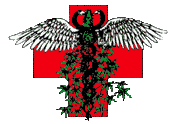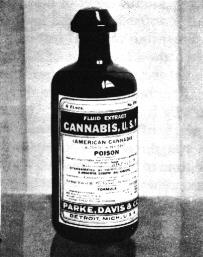|
参照項目:

 繊維、食物、燃料、
マリファナ、
宗教、
法律
繊維、食物、燃料、
マリファナ、
宗教、
法律

 Medical marijuana links
Medical marijuana links

 "Marijuana and Medicine: Assessing the Science Base"
"Marijuana and Medicine: Assessing the Science Base"

 マリファナを合法医薬品とするためのグループ・キャンペーン
マリファナを合法医薬品とするためのグループ・キャンペーン
|
Medical uses of Marijuana
|
Cannabis hemp (marijuana) has been used a medicine for thousands of years.
It is mentioned as a medicine in the susruta of India before the
8th century A.D. It's main uses nowadays include treatment of pain,
nausea, lack of appetite, sleeping disorders, auto-immune diseases
(MS) and glaucoma.
|

|

Up until the 1930s and 1940s
extracts of Indian hemp were used medically to treat a wide variety
of diseases. In the USA it was a legal medicine until 1969 and in Britain
it was legal until 1971. At the only hearing for the 1937 "Marihuana Tax
Act" the representative of the American Medical Association opposed the
new law, worrying it would prevent medical use.
FLUID EXTRACTS AND TINCTURES
CANNABIS, U.S.P. (American Cannabis):
Fluid Extract No. 598 .......................(Alcohol 80%)..
5.00
 |
Fluid Extract Cannabis, in common with other of our products that cannot be accurately
assayed by chemical means, is tested physiologically and made to conform to a standard
that has been found to be, in practice, reliable. Every package is stamped with the date
of manufacture. Physiologic standardization was introduced by Parke, Davis & Co.
This fluid extract is prepared from Cannabis sativa grown in America. Extensive
pharmacological and clinical tests have shown that its medicinal action cannot be
distinguished from that of the fluid made from imported East Indian cannabis. Introduced
to the medical profession by us.
Average dose, 1 1.2 mins. (0.1 cc). Narcotic, analgesic, sedative. |
For quarter-pint bottles add 80c. per pint to the price given for pints
From the Parke, Davis & Company
1929-1930 physicians' catalog.
|

In Japan hemp used to have numerous medical applications. Until after WW2
Japanese doctors prescribed cannabis
for asthma and other respiratory diseases. Marijuana seeds were used as
a mild laxative.

After hearing extensive evidence
Francis
L. Young, Administrative Law Judge
 of the
US drug police DEA
ruled on September 6, 1988:
of the
US drug police DEA
ruled on September 6, 1988:
"The evidence in this record clearly shows that marijuana has been
accepted as capable of relieving the distress of great numbers of very
ill people, and doing so with safety under medical supervision. It would
be unreasonable, arbitrary and capricious for DEA to continue to stand
between those sufferers and the benefits of this substance in light of
the evidence in this record."
"The administrative law judge recommends that the Administrator
conclude that the marijuana plant considered as a whole has a currently
accepted medical use in treatment in the United States, that there is no
lack of accepted safety for use of it under medical supervision and that
it may lawfully be transferred from Schedule I to Schedule II. The judge
recommends that the Administrator transfer marijuana from Schedule I to
Schedule II."
|

There are 8 patients in the USA whom the Federal government
supplies with 300 marijuana cigarettes every month. On of these patients
is Robert Randall who would have gone blind from glaucoma 25 years
ago had he not had access to marijuana to treat his condition.
Every other year the University of Mississippi grows some 7000 square
metres of marijuana plants for the U.S. government.
There are 67 million blind people worldwide who lost their eyesight
because of glaucoma, many of them in poor countries in the Caribbean
and Africa. Marijuana is the most affordable drug that could have saved
their eyesight.

Medical marijuana in Tokyo:
A Multiple Sclerosis patient will be seeking a taima research
license to grow his own medical marijuana.
The ancient weed
is still being cultivated by the city of Tokyo at the
Tokyo Metropolitan Medicinal Plant Garden.
See also:

 website of the Japan Medical Marijuana Association
website of the Japan Medical Marijuana Association

In November 1996 voters in the U.S. states of California and Arizona voted with
an overwhelming majority (56-44% and 65-35%) to legalise marijuana for
medical use when recommended by a doctor.
In November 1998 voters in Alaska, Washington, Oregon, Nevada and Arizona
(for the second time) voted the same way. Voters in Colorado and
Washington, D.C. also approved of medical marijuana but their votes
were ignored.

In reponse to the 1996 election victories for medical marijuana,
the head of the Office of National Drug Control Policy of the US,
commonly known as the "drug czar", in 1997 commissioned a
$900,000, 18 month study to settle once and for all if marijuana
is medicine. Released on March 17, 1999 the study,
"Marijuana and Medicine: Assessing the Science Base",
confirmed what we've known all along: Marijuana does indeed have
medical uses for a number of serious medical conditions. The study suggested
that uses of marijuana that do not involve smoking should be investigated
but that until then smoked marijuana may be the only thing that works
for some patients. Maybe just as important, it also discredited the claims that marijuana is
highly addictive, that it acts as a gateway to hard drugs and that its
medical use would lead to increased non-medical use. If the government
were to acknowledge that marijuana is neither highly addictive nor
a gateway to other addictive drugs then what reason is there left to
keep arresting its users, especially those patients who have no better
medicine to treat various illnesses?

Links:

 医療大麻を考える会 (Japan Medical Marijuana Association)
医療大麻を考える会 (Japan Medical Marijuana Association)


 ACMed (Germany)
ACMed (Germany)

 The British Medical Journal Editorial (1995)
The British Medical Journal Editorial (1995)

 New England Journal of Medicine Editorial (1997)
New England Journal of Medicine Editorial (1997)

 Affidavit by Dr. Grinspoon (Canada, 1997)
Affidavit by Dr. Grinspoon (Canada, 1997)

 Marijuana Policy Project on medical uses of marijuana
Marijuana Policy Project on medical uses of marijuana

 Carl. E. Olsen's Marijuana Archive
Carl. E. Olsen's Marijuana Archive

 Californians for Compassionate Use
Californians for Compassionate Use

 Medical Marijuana Magazine
Medical Marijuana Magazine

 医療大麻解放戦線
医療大麻解放戦線
参照項目:

 繊維、食物、燃料、
マリファナ、
宗教、
法律
繊維、食物、燃料、
マリファナ、
宗教、
法律
|









